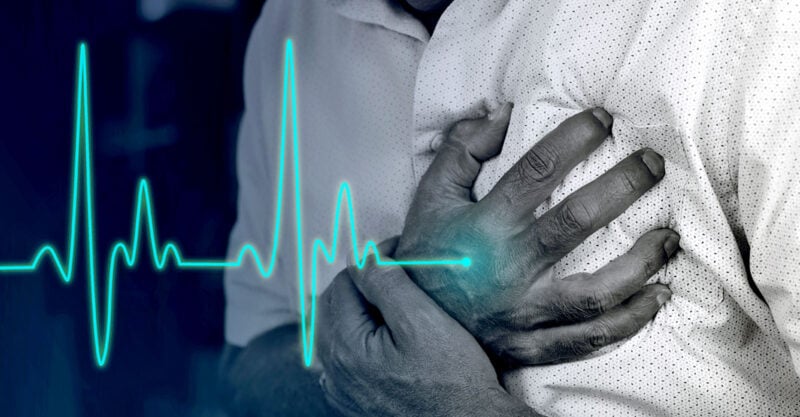Pfizer, CDC Withheld Evidence of Myocarditis After COVID Shots, New Documents Reveal
Guest Post by
Pfizer and the Centers for Disease Control and Prevention (CDC) withheld evidence that COVID-19 vaccinations were causing myocarditis, according documents obtained by Children’s Health Defense via a Freedom of Information Act request to the CDC, and documents leaked this week to Project Veritas.

Pfizer and the Centers for Disease Control and Prevention (CDC) withheld evidence that COVID-19 vaccinations led to an increased risk of myocarditis, especially in young males, according to two sets of documents made public this week.
Confidential Pfizer documents leaked Thursday by Project Veritas show the company had “evidence that suggests patients who receive a COVID-19 vaccine are at an increased risk of myocarditis.”
And heavily redacted CDC documents obtained by Children’s Health Defense (CHD) via a Freedom of Information Act (FOIA) request indicate the agency provided an undercounted figure of post-COVID-19-vaccination myocarditis cases to Israel’s Ministry of Health in early 2021.
The latest revelations come as Germany, Japan and other governments are raising questions about the significant numbers of severe adverse events recorded in individuals following administration of the COVID-19 vaccines.
According to researchers at the National Organization for Rare Disorders, myocarditis can result from infections, or it may result directly from a toxic effect such as a toxin or a virus.
“More commonly the myocarditis is a result of the body’s immune reaction to the initial heart damage,” researchers said.
Severe myocarditis can permanently damage the heart muscle, possibly causing heart failure.
Internal documents contradict Pfizer claim of ‘low incidence of myocarditis’
An internal Pfizer document leaked to Project Veritas on Thursday, updated Feb. 11, 2022, and authored by eight scientists in Pfizer’s Drug Safety Research & Development division, indicates that the drugmaker was aware of a connection between mRNA COVID-19 vaccines and higher incidence rates of myocarditis within two weeks of vaccination — particularly following the second dose of the primary series.
“There is evidence that suggests patients who receive a COVID-19 vaccine are at an increased risk of myocarditis,” the document read.
“Onset was typically within several days after mRNA COVID-19 vaccination (from Pfizer or Moderna), and cases have occurred more often after the second dose than the first dose.”
Pfizer cited CDC data to make this determination:
“Since April 2021, increased cases of myocarditis and pericarditis have been reported in the United States after mRNA COVID-19 vaccination (Pfizer-BioNTech and Moderna), particularly in adolescents and young adults (CDC 2021).”
“The pattern of cases conform, as per the label, to a pattern of myocarditis cases occurring in majority of young males below 29 years of age within the first two weeks post-vaccination.”
“The reasons for male predominance in myocarditis and pericarditis incidence post COVID-19 vaccination remain unknown.”
Although Pfizer couldn’t identify a “clear mechanism” behind the increased risk in males, it did identify several possibilities.
These included direct cardiotoxicity, acute/active viral infection, genetic predisposition and pre-existing conditions, a prior history of myocarditis, immune-mediated mechanisms and vaccine-associated autoimmunity, molecular mimicry to the spike protein and sex-related effects.
These cases occurred, according to the document, despite a claimed low incidence of myocarditis during the clinical trials for the mRNA COVID-19 vaccines.
“Within the participants 16 years of age and older from the Pfizer clinical trial dataset, two cases of pericarditis were reported through the data cut-off date of 18 June 2021,” the document read. “These cases originated from the Phase 3 clinical study C4591001 and both were deemed not related to study treatment by the Investigator.”
“There were no cases of myocarditis reported as serious adverse events through the data cut-off date of 18 June 2021,” the document added.
Based on these incidences of myocarditis, the document states the product labels for the Pfizer COVID-19 vaccine were updated to state:
“Post marketing data demonstrate increased risks of myocarditis and pericarditis, particularly within 7 days following the second dose of the 2-dose primary series.
“The observed risk is higher among males under 40 years of age than among females and older males. The observed risk is highest in males 12 through 17 years of age.”
This change had already been made as of August 2021, according to a document released as part of the so-called “Pfizer documents” — documents pertaining to the U.S. Food and Drug Administration’s (FDA) issuance of Emergency Use Authorization (EUA) to the Pfizer-BioNTech COVID-19 vaccine.
The “Pfizer documents” were released last year by court order following a FOIA request filed by Public Health and Medical Professionals for Transparency.
Another internal Pfizer document from these same “Pfizer documents” states that on July 13, 2021, it was suggested that myocarditis and pericarditis be added “to the PVP” (pharmacovigilance plan).
This addition appears to have taken place.
The Pfizer pharmacovigilance plan of July 28, 2021 — also contained within the “Pfizer documents” release — lists myocarditis and pericarditis as “important identified risk[s]” identified in Pfizer’s safety database on June 18, 2021.
A pharmacovigilance plan “proposes activities to better characterize and assess the risks during the lifecycle of a medicine. (e.g., to investigate frequency, severity, seriousness and outcome of a risk under normal conditions of use, and/or which populations are particularly at risk).”
Pfizer’s July 28, 2021 pharmacovigilance plan stated that two serious adverse events of pericarditis were reported during the C4591001 clinical trial, although “both [were] deemed not related to study treatment by the Investigator.”
The document also refers to data from Pfizer’s safety database, stating that among people 16 and older, “490 cases reported events related to myocarditis and 371 cases reported events related to pericarditis (in 38 of these 823 cases, the subjects developed both myocarditis and pericarditis related events).”
Of these 490 cases, 26 were later definitively rejected as not being myocarditis, leaving 464 cases ranging from “definitive case” to “reported event.” From there, 459 were listed as “serious,” 337 required hospitalization, and 14 resulted in death.
Nearly 71% of these cases were recorded in males.
Of 371 reported pericarditis cases in individuals 16 and over, all but one was listed as “serious,” 206 required hospitalization, and 3 resulted in death.
Pfizer, in the same pharmacovigilance plan, claimed that no myocarditis or pericarditis cases were recorded in C4591001 trial participants ages 12 to 15.
However, its safety database recorded 11 possible cases of myocarditis — all but one among males, 10 of which were “serious” and nine of which required hospitalization.
Four cases of pericarditis among males between the ages of 12 and 15 also were recorded in the safety database, three of which were considered serious and one of which required hospitalization.
However, in the July 28, 2021 pharmacovigilance plan, Pfizer told the FDA:
“Considering the low rates of myocarditis and pericarditis reported following vaccination, balanced with the risk of death and illness (including myocarditis) caused by SARS-CoV-2, the public health impact of post-vaccination myocarditis and pericarditis is minimal.”
Nevertheless, in another leaked document publicized by Project Veritas, dated May 2022, further confirms Pfizer was aware of the increased incidence of myocarditis.
According to the leaked document:
“Adverse events (AEs) following COVID-19 vaccination are of high clinical importance: even adverse events with small incidence may be seen in appreciable numbers given the massive scope of the vaccination effort.
“There is evidence that suggests patients who received a COVID-19 vaccine are at an increased risk of myocarditis.”
CDC undercounted myocarditis cases in 2021
Documents provided by the CDC in response to an Oct. 12, 2022 FOIA request submitted by CHD reveal the agency provided an undercounted number of recorded myocarditis cases following COVID-19 vaccination to the Israeli Ministry of Health.
The FOIA request asked the CDC to “provide all emails sent by any of the relevant individuals or received by any of the relevant individuals (whether directly or via cc or bcc) containing the search word ‘myocarditis’” between Oct. 1, 2020 and April 30, 2021.
“There has been considerable public discussion of and controversy about how to weigh
the risk of myocarditis that is associated with COVID-19 vaccines,” the request stated. “The public has a significant interest in having a full understanding of how U.S. public health agencies have addressed this issue.”
Following a response by the CDC, CHD on Nov. 17, 2022, narrowed down its request to include only documentation containing the term “myocarditis” within 25 words of “(covid or report* or child* or adolescent* or young*or teen* or male or fatal* or death* or die* or serious or severe or hospital*).”
The heavily redacted 985-page tranche of documents provided to CHD included a Feb. 28, 2021 request, on page 692, from Israel’s Ministry of Health. The request, logged on that date by CDC’s internal task tracking system, stated:
“We are seeing a large number of myocarditis and pericarditis cases in young individuals soon after Pfizer COVID-19 vaccine. We would like to discuss the issue with a relevant expert at CDC.”
A CDC email, dated March 10, 2021, and found on pages 710-714 of the document, read:
“They are investigating a safety signal of myocarditis/myopericarditis in a younger population (16-30 years old) following administration of Pfizer-BioNTech COVID-19 vaccine.
“The Ministry of Health stated they received reports of around 40 cases of this adverse event.”
In the March 10, 2021 response, page 861, sent by the CDC to the Israeli Ministry of Health stated:
“A search of the U.S. Vaccine Adverse Event Reporting System (VAERS) conducted on February 23, 2021 revealed 27 cases (6 cases of myocarditis, 7 cases of myopericarditis, 14 cases pericarditis).
“Twelve cases occurred after dose 1, 7 cases after dose 2, and the dose was not reported for 8 cases. Four patients had comorbid conditions that could suggest alternate etiologies for the adverse event.
“During this analysis period the reporting rate of myopericarditis following administration of the mRNA COVID-19 vaccines was low and estimated to be 0.7 per million doses of vaccine administered.
“However, the limitations of passive surveillance such as under-reporting, lack of a control group, missing and incomplete data make it challenging to assess causation.
“Thus, FDA has not made a final determination regarding the causality between myopericarditis and the mRNA COVID-19 vaccines.”
However, up to Feb. 23, 2021, VAERS had actually received 36 reports of myocarditis — although at that time, the database was significantly backlogged.
It is unclear why data from a Feb. 23, 2021 search was provided by the CDC, when the request from Israel’s Ministry of Health was submitted on Feb. 28, 2021. There is no indication that there was contact from the Israeli health ministry with the CDC regarding this issue prior to Feb. 28, 2021.
While reports submitted to VAERS require further investigation before a causal relationship can be confirmed, the system has been shown to report only 1% of actual vaccine adverse events.
Studies have found further deficiencies in the VAERS system, including deleted or missing reports, the delayed entry of reports and the “recoding of Medical
Dictionary for Regulatory Activities (MedDRA) terms from severe to mild.”
Out of the deleted or missing reports, 13% pertained to deaths and 63% represented severe adverse events.
VAERS data is publicly accessible on the internet and presumably would already have been available to the Israeli Health Ministry as a result, therefore it is unclear why the CDC appears to have relied on this data in its response to Israel.
Moreover, by March 10, 2021, the presumed date of the CDC response to the Israeli Health Ministry, 14 more cases of myocarditis were reported to VAERS, for a total of 49 such cases identified in the database.
Of the 36 myocarditis cases reported to VAERS by Feb. 23, 2021, 25 were in males, 21 involved the Moderna vaccine (15 males), and 15 involved the Pfizer-BioNTech vaccine (10 males).
And of the 49 cases recorded by March 10, 2021, 35 were in males, 26 involved the Moderna vaccine (20 males) and 23 involved the Pfizer-BioNTech vaccine (15 males).
The average age of the patients was 33.6 and median age was 31.5 — with the average age of male cases being 31.1 (median 28) and the average age of females 40.8 (median 36.5), indicating a higher incidence in younger males.
The average number of days before onset and diagnosis following vaccination was 5.4, with a median of 3 days.
With hundreds of pages’ worth of redactions, it is unclear if there are more documents or data that would provide further insights into the response provided by the agency to Israel’s Ministry of Health.
In its Feb. 24 response, the CDC claims the redacted documents are protected by statute, confidentiality laws or privacy laws.
Notably, on the same day as the Israel Ministry of Health’s request to the CDC, Pfizer published a document — released as part of last year’s “Pfizer Documents” release from the FDA — titled “Cumulative Analysis of Post-Authorization Adverse Event Reports of PF-07302048 (BNT162B2) received through 28-Feb-2021.”
BNT162B2 refers to the Pfizer-BioNTech COVID-19 vaccine that received Emergency Use Authorization from the FDA.
This document indicated that 25 cases of myocarditis were reported by Feb. 28, 2021 as part of a list of “adverse events of special interest” (AESI).
This figure drew from several databases, including the Brighton Collaboration (SPEAC), the EU’s ACCESS protocol, U.S. CDC (preliminary list of AESI for VAERS surveillance) and the UK’s Medicines and Healthcare Products Regulatory Agency.
Studies show COVID shots lead to increased risks of myocarditis
Several recent studies have shown an increased prevalence of myocarditis following COVID-19 vaccination.
“Delayed Vigilance: A Comment on Myocarditis in Association with the COVID-19 Injections,” by Karl Jablonowski, Ph.D. and Brian Hooker, Ph.D., P.E., published Oct. 17, 2022 in the International Journal of Vaccine Theory, Practice, and Research, found that two months after COVID-19 vaccines were rolled out to the public, a statistically significant safety signal for myocarditis in males ages 8 to 21 appeared in VAERS.
However, as previously reported by The Defender, even though this safety signal was visible as early as Feb. 19, 2021, CDC officials waited until May 27, 2021 before alerting the public.
By then, over 50% of the eligible U.S. population had received at least one mRNA COVID-19 vaccine — and the FDA expanded the EUA of the Pfizer-BioNTech vaccine to include adolescents 12 and older.
Another study, released April 15, 2022 by seven Israeli researchers, examined the incidence of myocarditis and pericarditis in adults previously were infected with COVID-19, between March 2020 and January 2021.
Despite arguments that an increase in myocarditis diagnoses may be attributed to COVID-19 infections instead of the vaccines, the study “did not observe an increased incidence of either pericarditis nor myocarditis in adult patients recovering from COVID-19 infection.”
As of March 3, 16,641 cases of myocarditis were recorded in VAERS following the receipt of a COVID-19 vaccine or booster — with the number growing to 16,660 when including diagnoses of bacterial myocarditis, infectious myocarditis, mycotic myocarditis, post-infection myocarditis and septic myocarditis.
Of the latter number, 10,701 cases (64.2%) were recorded in males.
While the age of over half of the patients in these recorded cases was listed as “unknown,” in cases where an age was recorded, myocarditis diagnoses peaked in the 18-29 year age group, with high prevalence also found in the 6-17 and 30-39 age groups.
Of 2,778 cases in the 18-29 age group, 2,211 were recorded in males — further indicating the particularly high risk of myocarditis young males face following COVID-19 vaccination.
More governments raising concerns about myocarditis
As early as October 2021, Sweden’s Public Health Agency paused Moderna’s COVID-19 vaccine for people born 1991 and later, “as data pointed to an increase of myocarditis and pericarditis among youths and young adults that had been vaccinated,” according to Reuters.
At around the same time, Finland’s public health authorities also paused the vaccine in young people.
And in November 2022, Sweden paused the Novavax COVID-19 vaccine for those under 30, due to an increased risk of myocarditis and pericarditis.
As reported by The Defender in June 2022, Novavax received EUA from the FDA despite “Multiple events of myocarditis/pericarditis” recorded during clinical trials.
Earlier this week, Yanagase Hirofumi, a member of Japan’s House of Councillors, accused the Japanese government of covering up injuries and deaths stemming from the mRNA COVID-19 vaccines.
Hirofumi told the House of Councillors that in Japan’s vaccine-related adverse events tracking system, at least 2,001 deaths following COVID-19 vaccination have been recorded.
However, despite “approximately 260 cases in which the doctor in charge reported that there was probably a link between the vaccine and the death” and, citing Japan’s health minister, “52 cases where a pathologist has performed an autopsy, and reported that there is a link between the vaccine and the death,” the database indicates that “only one case has been found to have a causal relationship between the vaccine and death.”
Hirofumi cited the example of “a man in his 30s” who “died three days after receiving the second dose of the vaccine. The cause of death was myocarditis,” adding that “ as a result of the autopsy, doctors concluded that there was a link between the vaccine and the death.”
In an interview on Sunday, Germany’s federal minister of health Karl Lauterbach — previously a proponent of a national vaccine mandate who had stated the COVID-19 vaccines had “no side effects” —admitted that serious adverse events were prevalent and that the vaccine injured are being ignored by the authorities.



